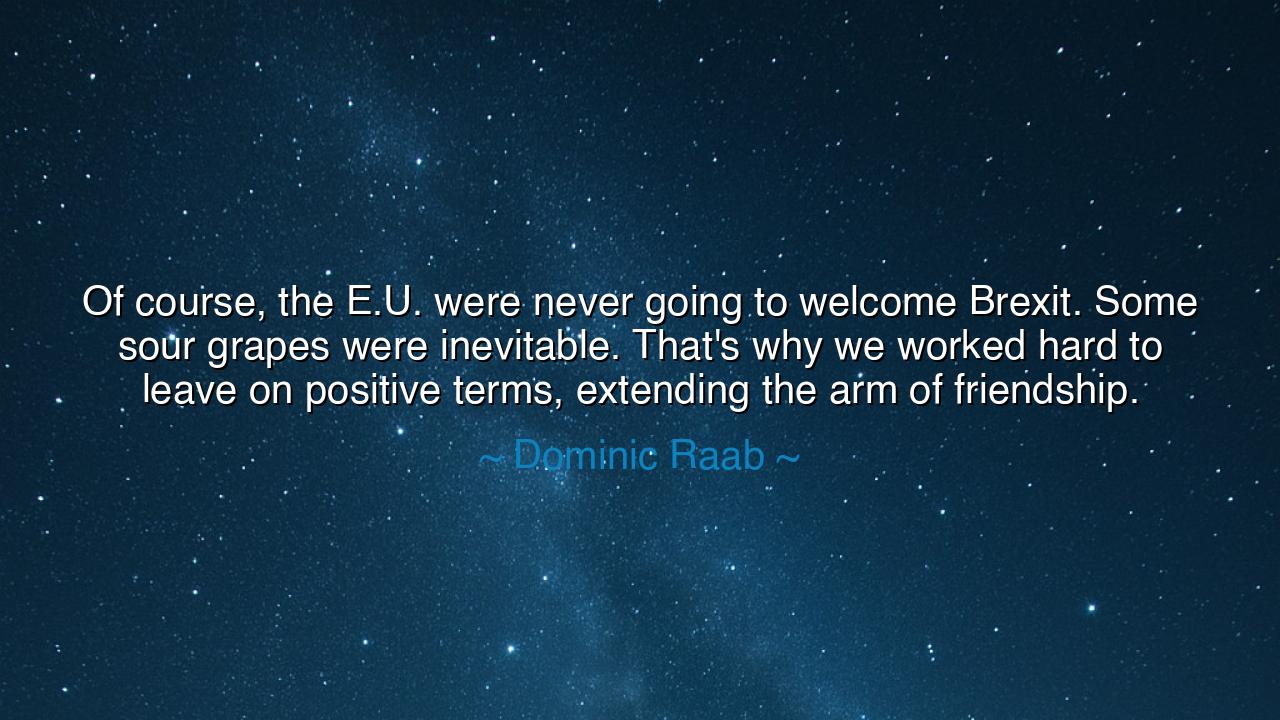
Of course, the E.U. were never going to welcome Brexit. Some sour
Of course, the E.U. were never going to welcome Brexit. Some sour grapes were inevitable. That's why we worked hard to leave on positive terms, extending the arm of friendship.






The British statesman Dominic Raab, speaking in the wake of one of the most divisive events in modern political history, once said: “Of course, the E.U. were never going to welcome Brexit. Some sour grapes were inevitable. That’s why we worked hard to leave on positive terms, extending the arm of friendship.” These words, though rooted in politics, rise above their moment to touch upon a timeless truth—the challenge of separation without enmity, of independence with grace. Raab’s reflection is not merely about nations parting ways; it is about the human art of leaving well, of walking away with dignity and kindness even when hearts or histories are heavy.
The meaning of the quote lies in its balance of realism and hope. Raab acknowledges the inevitability of resentment and friction when long bonds are broken—what he calls “sour grapes.” No great separation, whether between nations or friends, occurs without pain. Yet, his focus is not on the bitterness, but on the moral effort to rise above it. To “extend the arm of friendship” in the midst of division is an act of wisdom, humility, and courage. It means refusing to let pride or wounded feeling rule the heart. It means recognizing that even when unity ends, respect can remain.
This philosophy echoes far beyond politics—it speaks to the very rhythm of human existence. The ancients understood this well. When empires fractured or allies drifted apart, those who acted with magnanimity were remembered not for their victories, but for their grace in departure. The Stoic philosophers taught that all things in life are transient: companionship, power, even love. The wise man, they said, accepts loss without bitterness and gives thanks for what was shared. Raab’s words belong to this lineage of thought: that even when paths diverge, the mature soul seeks peace, not triumph.
History offers many mirrors to this lesson. Consider George Washington’s Farewell Address, in which he urged Americans to maintain peace with other nations even as they charted their own course. He understood that freedom must not descend into arrogance, that independence is strongest when coupled with friendship. Or look further back, to the story of Abraham and Lot in the Book of Genesis—two men whose herds grew too large to share one land. When conflict threatened to divide them, Abraham said, “Let there be no strife between us, for we are brethren.” And so they parted in peace. In these ancient and modern examples alike, we find the same truth: that separation is inevitable, but hostility is not.
Raab’s imagery—“extending the arm of friendship”—is especially evocative. It is the gesture of a warrior who chooses peace after the battle is done, or of a friend who reaches across silence to say, “Though we part, I wish you well.” It speaks of maturity—the kind that seeks reconciliation not out of weakness, but out of strength. For it takes far more courage to forgive than to retaliate, and far greater wisdom to build bridges than to burn them. In this way, Raab’s words transcend their political setting to become a meditation on the nobility of restraint.
There is also in his statement a quiet acceptance of reality. “Some sour grapes were inevitable,” he says, acknowledging that not all will meet peace with peace. Yet he persists in choosing goodwill. This is the mark of true leadership and emotional mastery: the refusal to be ruled by the reactions of others. In any conflict—personal or political—there will always be those who cling to grievance. The wise, however, understand that bitterness is self-poison, and that one must not mirror the resentment of the world, but offer it healing instead.
The lesson for us all is clear and profound: in life, there will be partings, endings, and disagreements. But we are not defined by the fact that we part—we are defined by how we part. When a friendship ends, when a business fails, when a path diverges, choose dignity over spite, respect over revenge. Speak with gratitude for what was, rather than anger for what is lost. For every bridge you preserve, even in departure, is a seed of peace that may one day bear fruit again.
So let Dominic Raab’s reflection stand not only as a commentary on a nation’s independence, but as a guide for the independence of the soul. To “extend the arm of friendship” even in moments of division is to act as the ancients would have counseled—with patience, with grace, and with the understanding that no true victory is ever built on bitterness. For only those who can part in peace are truly free—and only those who choose friendship in the end leave behind a legacy of honor.






AAdministratorAdministrator
Welcome, honored guests. Please leave a comment, we will respond soon